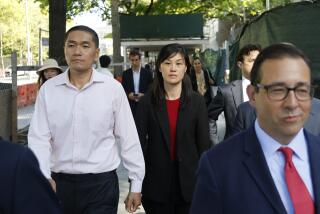Chinese-born engineer convicted of espionage
A Chinese-born engineer living in Orange County was convicted Thursday in the first-ever trial under the Economic Espionage Act.
Dongfan “Greg” Chung, 73, of Orange, a former aerospace engineer at the Boeing plant in Huntington Beach, was found guilty of acting as a foreign agent, conspiring to violate the Economic Espionage Act and seven other charges. He was found not guilty of obstruction of justice.
The ruling came after a 10-day trial and roughly three weeks of deliberation by U.S. District Court Judge Cormac Carney. Chung chose to have his case heard by a judge rather than a jury.
“The trust Boeing placed in Mr. Chung to safeguard its proprietary and trade secret information obviously meant very little to Mr. Chung,” Carney said.
“He cast it aside to serve the PRC [People’s Republic of China], which he proudly proclaimed as his ‘motherland.’ ”
Chung, who had been free on bail, was immediately taken into custody because he is considered a flight risk.
“He obviously has very close contact with the Chinese government that is ongoing, and frankly, all he has to do is go to the Chinese Consulate and . . . he’d be gone,” Assistant U.S. Atty. Gregory Staples said in arguing that Chung be placed in custody.
With his wife and son standing nearby, Chung stood up and took off his dark blue suit coat and yellow-patterned tie, then relinquished his cellphone, wallet, a folded-up wad of cash and his car keys. He put his hands behind his back and was cuffed by U.S. marshals.
In a search of Chung’s home, investigators found some 300,000 documents -- some of them stashed in the crawl space -- that included plans for the fueling system of a Delta 4 rocket, an antenna system for the space shuttle and other aerospace and military technologies.
“As federal agents sifted through the hundreds of thousands of pages of documents in Mr. Chung’s home, the story of Mr. Chung’s secret life became clear,” Carney wrote in his 31-page decision. “He was a spy for the PRC.”
In closing arguments last month, the government contended that since the late 1970s, Chung had done everything in his power to lend his technical expertise to China’s advancement, sending information via mail, sea freight, a Chinese agent named Chi Mak and the Chinese Consulate.
“He didn’t blindly collect and provide random information,” Assistant U.S. Atty. Ivy Wang said. “He received specific tasking lists.”
Defense attorneys said they expected to appeal. They acknowledged that Chung had an affinity for China and provided some information decades ago during lectures at Chinese universities. But the information was publicly available, the defense said, and Chung did not agree to give Chinese officials sensitive material.
“Mr. Chung never went to the next level,” attorney Thomas Bienert told Cormac. He “walked an interesting line, and certainly a risky line . . . but not a line that is criminal.”
Chung, the defense said, had the documents in his home because he planned to write a book about the space shuttle.
Chung, a naturalized U.S. citizen, was born in China and came to the United States in the early 1960s. He worked for Rockwell International in Downey until it was bought by Boeing in 1996. He was laid off by Boeing in 2002. He returned as a consultant after the Columbia space shuttle disaster in 2003 but was fired when the FBI began its probe in 2006.
After Chung was laid off, the prosecution said, he spent considerable time organizing documents for a planned trip to China and met regularly with Mak, whom the government contends was a conduit to Chinese officials. Mak was convicted of spying for China two years ago and is serving a 24-year term.
In Washington, the Justice Department hailed the verdict as confirmation that its aggressive campaign to root out Chinese spies is working.
“For years, Mr. Chung stole critical trade secrets from Boeing . . . all for the benefit of the government of China. Today’s verdict should serve as a warning to others willing to compromise America’s economic and national security to assist foreign governments,” said David Kris, assistant attorney general for national security.
The economic espionage charges against Chung were considered especially serious given the length of time involved, Justice Department officials said. A handful of other people have been charged under the Economic Espionage Act, in cases mostly involving China, and some pleaded guilty in plea agreements. But Chung’s was the first to go to trial, Justice Department officials said.
Since late 2006, the Justice Department has prosecuted more than 50 defendants accused of illicit exports of restricted technology to China, theft of trade secrets for the benefit of China (economic espionage) or classic espionage for China.
Prosecutors said they would probably recommend a 15- to 20-year prison sentence for Chung. Sentencing is scheduled for Nov. 9.
--
christopher.goffard@latimes.com
Times staff writer Josh Meyer contributed to this report.
More to Read
Sign up for Essential California
The most important California stories and recommendations in your inbox every morning.
You may occasionally receive promotional content from the Los Angeles Times.











